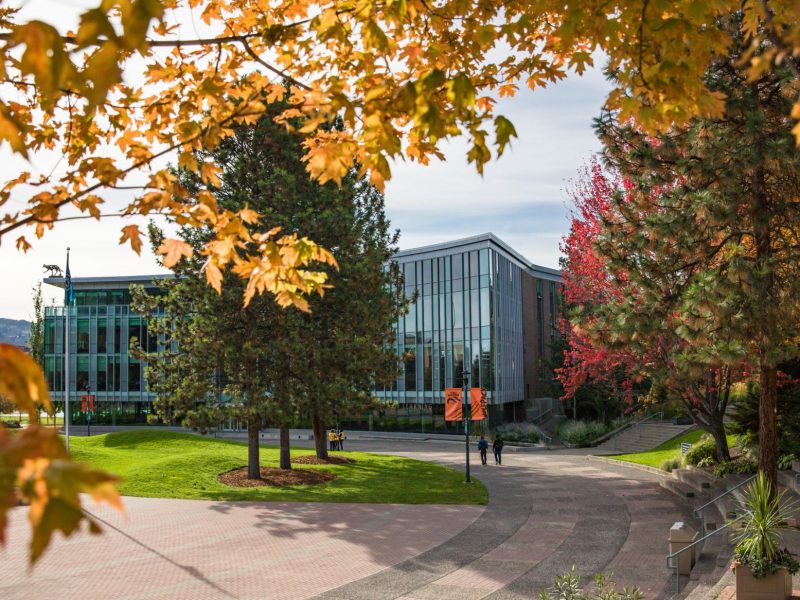
Students signing up for university this fall have access to improved financial resources that could reduce the cost of their education.
Thompson Rivers University is hosting a free public event so prospective students can find out more about their financial options. This virtual event, University affordability in a COVID-19 era, is slated for Wednesday, Aug. 5, at 6 p.m. on TRU’s YouTube channel. Prospective and returning students can get answers to their questions about enrolling this fall, including how to pay for school. Anyone can join in here.
“We are delighted to be joining in this important conversation between TRU’s student union and the university as students prepare for September,” said Thompson Rivers University Student Union Executive Director Nathan Lane.
Most of TRU’s programs have some of the lowest tuition rates in BC and the university provides a range of bursaries and scholarships. While most classes will be conducted online, TRU is able to draw upon its 42 years of experience providing online education to make the experience as engaging as possible for students.
“They don’t need the additional uncertainty of how they will pay for school,” said Gordon Down, director of Student Awards and Financial Aid at Thompson Rivers University.
“They already face uncertainty around their courses, their day-to-day living experiences and what the future will bring as COVID-19 continues to persist and thrive in pockets around the globe.”
New, one-time funds
The pandemic has prompted federal and provincial governments to offer one-time funds in addition to their usual programs. The biggest amount comes from the Canada Student Grant for Full-Time Students, a non-repayable program for lower-income students that is doubling to $6,000 from the usual $3,000.
Additionally, StudentAidBC recently announced the new, non-repayable BC Access Grant that can provide students with up to $4,000 a year.
“If you add in the extra loans available and the grants, that’s over $7,500 for a school year. In that way, there’s never been a more affordable time to go to school. And if you’re living at home, then it becomes really inexpensive, relative to what it could be,” said Down.
His $7,500 estimate includes funds from programs that are in place this summer. Some of them, like the Canada Emergency Student Benefit, end in late August, while others are available over a longer period. Dates are changing even now, so Down advised students to check each program’s information carefully for deadlines and requirements.
Numerous options to explore
Here is a list of resources students can explore to support their studies this fall:
Canada Student Grant for Full-time Students: This grant is for lower-income students and is non-repayable. For one year only, it has been doubled to $6,000 from $3,000.
BC Access Grant: All students who apply for StudentAid BC are automatically assessed for the new B.C. Access Grant for low- and middle-income students who can receive up to $4,000 a year.
Canada Student Service Grant (This grant has been suspended. Please check the website for the latest information.)
Canada Emergency Student Benefit (CESB): Until August 31, 2020. This grant provides up to $1,250 for every four-week period up until Aug. 31, 2020, for students who haven’t been able to find work due to the pandemic.
Canada Emergency Response Benefit (CERB): This program pays $2,000 every four weeks, up to 24 weeks, for those who have stopped working due to the pandemic.
Canada Student Loans: This program has had the weekly maximum loan limit boosted to $350 from $210. There are also other changes for the 2020-21 school year, including the waiving of a requirement that students pay a part of their education costs.
Scholarships and bursaries: TRU offers numerous scholarships and bursaries. Students can also seek scholarships at Universities Canada, Scholarships Canada, Yconic and, for Indigenous students, Indspire.
Open Education Resources (OER): Students can look into Open Education Resources—free textbooks, supplementary manuals and guides on a variety of subjects that are available through BC’s Open Textbook collection. These resources are expanding and can help students save money on costly textbooks.
 Hole punched in Walmart
Hole punched in Walmart Cop cleared after cyclist hit
Cop cleared after cyclist hit Seniors in the housing crisis
Seniors in the housing crisis Tracking bird flu in cows
Tracking bird flu in cows Alberta braces for drought
Alberta braces for drought Premiers want co-operation
Premiers want co-operation Full Trump jury seated
Full Trump jury seated Iran fires at attack drones
Iran fires at attack drones  World's largest election
World's largest election  Body Shop explores sale
Body Shop explores sale Apple pulls apps from China
Apple pulls apps from China Oil and gas leases restricted
Oil and gas leases restricted Warriors ready for Round 2
Warriors ready for Round 2 Kalamalka Bowl cancelled
Kalamalka Bowl cancelled Rockets live to fight on
Rockets live to fight on Hilton teams up with Sia
Hilton teams up with Sia Swift still 'can't forgive' Kim
Swift still 'can't forgive' Kim Grimes to ‘cap the disarray’
Grimes to ‘cap the disarray’




